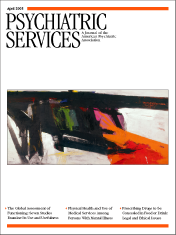To the Editor: Coercive physical measures are commonly used in psychiatric intensive care units. A variety of methods are used in different countries, depending on tradition, availability, and legislation (
1,
2), and several reports have been published on the different methods used (
3,
4,
5).
At the University Psychiatric Hospital in Ljubljana, Slovenia, net-beds were used for decades, but because of their unpopularity, they were abandoned in 1999, and bed-belts began to be used instead. The situation was ideal for evaluating the consequences in a naturalistic observational study. The study was approved by the national medical ethics committee. One of the goals was to evaluate the differences between patients managed with net-beds and patients managed with bed-belts. We also wanted to determine whether the management of patients changed after the abandonment of net-beds.
Data from the charts of all patients admitted during two two-month periods—from February 1 to March 31 in 1998 and in 1999—were examined. Information was collected on sociodemographic characteristics and on illness and treatment. Data from three instruments were obtained. Possible scores on the Clinical Global Impressions range from 1 to 7, with higher scores indicating greater impairment. Scores on the Global Assessment Scale range from 1 to 100, with higher scores indicating better functioning. Scores on the Brief Psychiatric Rating Scale range from 18 to 126, with higher scores indicating greater impairment. Data related to the use of coercive measures and all psychopharmacologic therapy (regular and as needed) were also obtained. Data from the two years were compared with use of the chi square test and the t test.
In 1998 a total of 332 patients (173 men, or 52 percent) were admitted, compared with a total in 1999 of 312 patients (159 men, or 48 percent). No differences were found between the two samples in sociodemographic or diagnostic characteristics. In 1998 coercive physical measures were used with 32 patients (10 percent); 24 (7 percent) were managed with net-beds, and eight (2 percent) with bed-belts. In 1999 coercive physical measures were used with 16 patients (5 percent); all were managed with bed-belts. Among the 24 patients who were managed with net-beds, 19 (79 percent) were taking antipsychotics on a required or as-needed basis. Among the 16 patients managed with bed-belts in 1999, seven (44 percent) were taking antipsychotics.
Patients managed with bed-belts had significantly higher scores on the Clinical Global Impressions than those managed with net-beds (5.6 compared with 4.9; t=2.53, df=39, p<.05); they had lower Global Assessment Scale scores (18 compared with 31; t=3.16, df=34, p<.01) and higher Brief Psychiatric Rating Scale scores (65.3 compared with 53.9; t=2.10, df=38, p<.05). Violence was the most cited reason for use of bed-belts and confusion (delirium) for use of net-beds. Significantly more patients with schizophrenia were managed with bed-belts.
The study had several limitations, in particular the short evaluation period and the lack of baseline data. However, some changes in the use of coercive physical measures and patient characteristics were found. In 1999 fewer coercive physical interventions in general were used, and the reason for use of coercive measures changed. Use of restrictive measures (bed-belts) was reduced, and only more severely disturbed patients were subjected to these measures. Because other characteristics of patients and staff did not change, we can conclude that changes in the availability of certain coercive measures in our hospital led to an overall reduction in use of coercive measures. Attention to the use of coercive measures may increase staff tolerance of patients' disturbed behaviors.
Acknowledgment
The study was supported by grant L3-4421-1620 from the Ministry of Education, Science, and Sport of the Republic of Slovenia.

